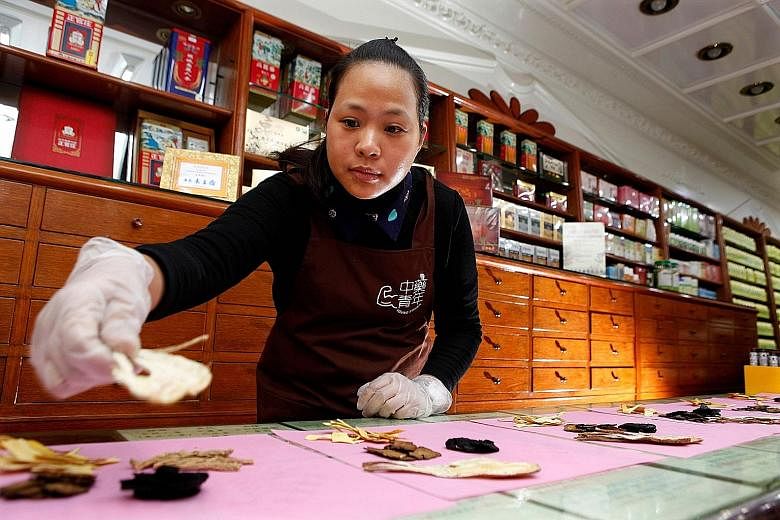TAIPEI • Traditional Chinese medicine (TCM) store owner Gu Cheng-pu knows her shop can only stay open as long as her ailing father-in-law lives, their careers hostage to a quirk in Taiwanese law that is killing off the industry.
At the back of her shop in New Taipei City, Ms Gu tips a plate of freshly cut Chinese liquorice roots into a wok of boiling honey, the first step in preparing one of her many traditional remedies.
"Chinese herbal medicine stores are a unique cultural icon," the 36-year-old explains. "They are not just a place where you come when you are sick to pick up medicine."
But shops like hers are dying out - with some 200 closing their doors every year - even though TCM remains wildly popular in Taiwan.
The authorities have not issued any new licences since 1998 and those that exist cannot be passed down to younger generations.
Ms Gu's father-in-law is the licence owner but he recently suffered a stroke and she now fears the worst. "If I am forced to close shop, the biggest regret for me other than losing our livelihood, is losing our tradition," she laments.
The licence shortage stems from an attempt by the authorities in the 1990s to regulate the largely artisanal industry and bring traditional remedies into the purview of the professional medical community. By refusing to issue new licences, the authorities hoped that doctors would offer TCM options in a more regulated and scientific capacity.
"In Taiwan, the simultaneous use of Western and Chinese medicine among the public is very prevalent and we need trained medical personnel to make sure they don't interact with harmful consequences," said Ms Chen Pin-chi, the head of Chinese medicine and pharmacy at the Health and Welfare Ministry. "We initially hoped that professionally trained Chinese medicine physicians or pharmacists might slowly take over the running of Chinese herbal stores."
But things did not turn out as planned.
The average age of a TCM store licence holder is 61 while the number of remaining stores has halved in the last 20 years to just 7,900.
According to the Compendium of Materia Medica, the 16th-century text that is the lodestar for TCM practitioners, there are more than 1,500 different kinds of herbs used in Chinese medicine. The average store might stock between 200 and 500 herbs, roots, animal parts and minerals - 355 of which are classified as medicine in Taiwan.
The licence shortage has prompted protests on the streets of Taipei and the government is in talks with industry leaders.
AGENCE FRANCE-PRESSE

